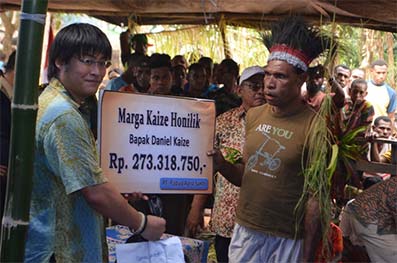 PT Papua Agro Sakti, which is investing in the sugar cane plantation business around the Animha and Jagebob areas, has paid out 3.651 billion Rupiah as ‘tali asih’ money to eight landowning clans. [‘Tali asih’ is a rather ambiguous term which is often used in Papua to mean compensation when a plantation company uses indigenous land]. The payment was made by PT Papua Agro Sakti’s director-in-chief Taruna Murdaya and was witnessed by the Merauke Bupati Dr Romanus Mbaraka, in Wayau village, Animha District, Merauke, on Wednesday (10/11).
PT Papua Agro Sakti, which is investing in the sugar cane plantation business around the Animha and Jagebob areas, has paid out 3.651 billion Rupiah as ‘tali asih’ money to eight landowning clans. [‘Tali asih’ is a rather ambiguous term which is often used in Papua to mean compensation when a plantation company uses indigenous land]. The payment was made by PT Papua Agro Sakti’s director-in-chief Taruna Murdaya and was witnessed by the Merauke Bupati Dr Romanus Mbaraka, in Wayau village, Animha District, Merauke, on Wednesday (10/11).
The deputy Merauke police chief Made Budi Darma and Regional Secretary Daniel Pauta alsso came to witness the event. The 3.6 billion Rupiah ‘tali asih’ money, given to the customary landowners from eight clans, was to cover 16,000 hectares of land out of a total 37,000 hectares which the company has permits for. ((awasMIFEE note: If the figures in this article are correct, that means land was compensated for at 228000 Rupiah per hectare (about US$20), less than the usual standard in Merauke which is 300000 Rupiah per hectare. Clearly neither amount would compensate in any way what the indigenous people could make from the sale of forest products over the 30-year period the company’s permit covers, let alone the value of the forest / savanna ecosystem for meeting subsistance, cultural and spiritual needs.))
Merauke Bupati (elected regency leader) Romanus Mbaraka explained that the original investment permit was issued in 2010, a long time before he took office. He had only renewed a permit from PT Hardaya Sawit Plantation in 2013, which became PT Papua Agro Sakti. “So I just changed it’s name,” he clarified. ((awasMIFEE note: Probably there is a mistake here and the previous plantation permit belonged to PT Hardaya Sugar Papua, not PT Hardaya Sawit Papua. PT Hardaya Sawit Papua’s permit is for an oil palm plantation a little further east. Both companies are owned by Siti Hartati Murdaya and Murdaya Poo’s family, but Siti Hartati Murdaya has been imprisoned for some time for offering bribes to local plantations in Sulawesi. The new company is presumably part of the same family business, but we have no information about the formal ownership structure. Location permits expire after three years and need to be renewed, but if the company has not managed to acquire a certain percentage of land during that time, the Bupati does have the right to refuse the renewal. Bupati Romanus Mbaraka, with elections approaching, is always keen to appear as a neutral facilitator between plantation companies and the indigenous population (which tends to oppose plantations), but he has issued several new plantation permits, as well as renewing permits issued by his predeccessor.))
According to the Bupati, he leaves all decisions about investment in Merauke to the general population. The government absolutely does not intervene. “The government is just a facilitator. The ones to make the decisions are the communities. If you (the community) say no then I also say no. The full authority lies with the communities” he said.
Menurut Bupati, semua investasi yang ada di Merauke ia serahkan semua kepada masyarakat untuk menentukan. Pemerintah tidak intervensi sama sekali. ‘’Pemerintah hanya memfasilitasi. Sementara yang menentukan adalah masyarakat. Kalau kalian (masyarakat) bilang tidak maka saya bilang tidak. Kalau masyarakat bilang yes maka saya juga katakan ya. Jadi kuasa sepenuhnya ada di masyarakat,’’ katanya.
Bupati Romanus also took the opportunity to state clearly that the land used was not being bought by the company, but would still be owned by the community. The company would only have Cultivation Rights title (HGU) for 35 years in accordance with the investment law and after that they would have to return to the community and discuss again whether the company could continue operating or not.
The Bupati also asked the company that in addition to any corporate social responsibility benefits it gives the community, the company must also return 20% of its investment to the community. “That means if the company grows then the community must also grow. Don’t let a company develop alone without the people joining in the growth”, he stated.
Source: Cenderawasih Pos http://www.cenderawasihpos.com/index.php?mib=berita.detail&id=7329
